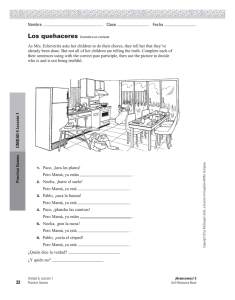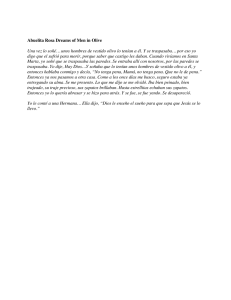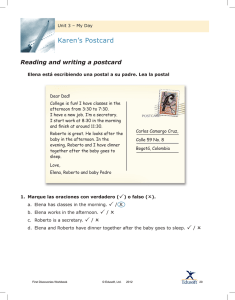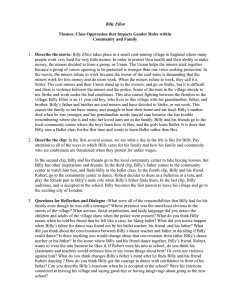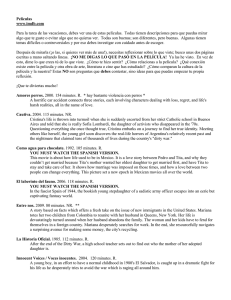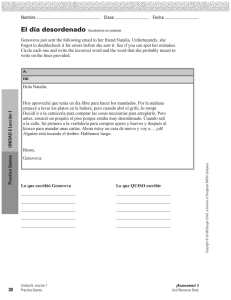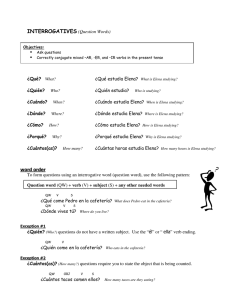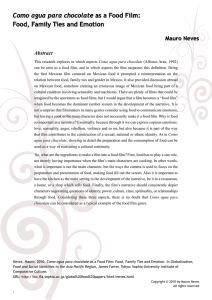2016 Specimen Mark Scheme 3 - Cambridge International
Anuncio
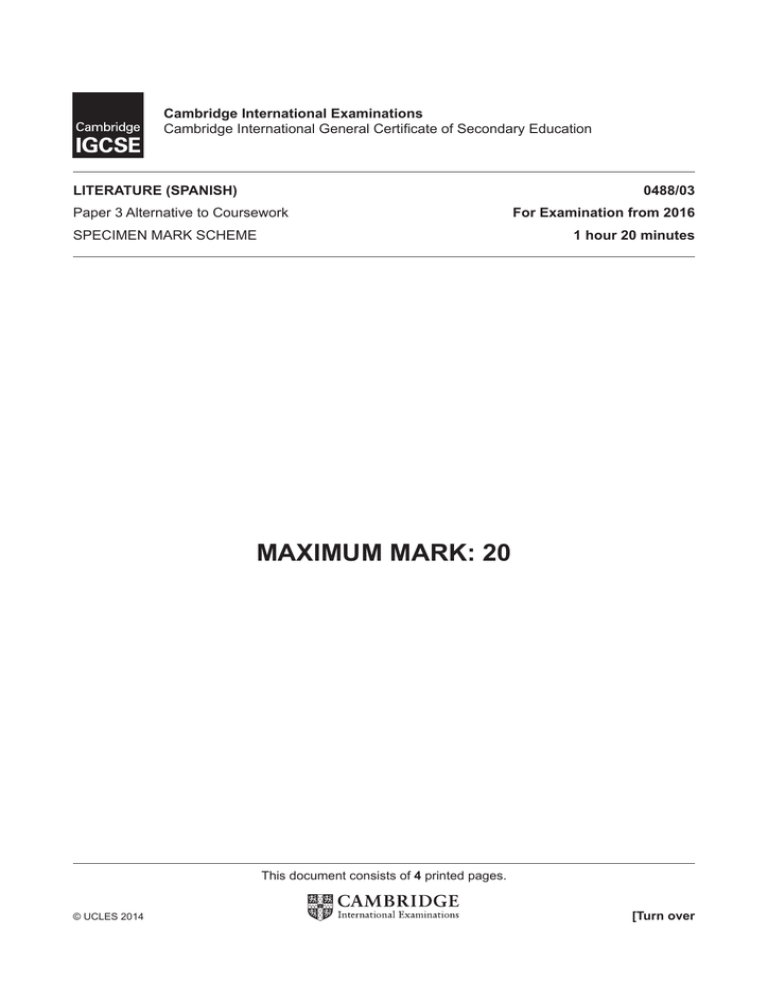
Cambridge International Examinations Cambridge International General Certificate of Secondary Education LITERATURE (SPANISH) 0488/03 Paper 3 Alternative to Coursework SPECIMEN MARK SCHEME For Examination from 2016 1 hour 20 minutes MAXIMUM MARK: 20 This document consists of 4 printed pages. © UCLES 2014 [Turn over 2 GENERAL CRITERIA FOR MARKING Answers will be marked according to the following general criteria: Band 8 20 19 18 Answers in this band have all the qualities of Band 7 work, with further insight, sensitivity, individuality or flair. They show complete and sustained engagement with both text and task. A detailed, relevant and possibly perceptive personal response that engages both with text and task Band 7 17 16 15 • shows a clear and at times critical understanding of the text and its deeper meanings • responds in detail to the way the writer achieves her/his effects (sustaining a fully appropriate voice in an empathic task) • integrates carefully selected and relevant reference to the text A developed and relevant personal response that engages both with text and task Band 6 14 13 12 • shows understanding of the text and some of its deeper implications • responds adequately to the way the writer achieves her/his effects (using suitable features of expression in an empathic task) • shows some thoroughness in selecting relevant references to the text Begins to develop a relevant personal response that engages both with text and task Band 5 11 10 9 • shows some understanding of meaning • makes a little reference to the language of the text (beginning to assume a voice in an empathic task) • uses some supporting textual detail Attempts to communicate a basic personal response Band 4 8 7 6 • makes some relevant comments • shows a basic understanding of surface meaning of the text (of character in an empathic task) • makes a little supporting reference to the text Some evidence of a simple personal response Band 3 5 4 3 • makes a few straightforward comments • shows a few signs of understanding the surface meaning of the text (of character in an empathic task) • makes a little reference to the text Band 2 2 1 Limited attempt to respond Band 1 0 no answer / insufficient answer to meet the criteria for Band 2 • shows some limited understanding of simple/literal meaning The detailed questions are intended to help the candidate respond. Candidates are required to answer them, but need not do so in a rigid sequence; some of the answers may be implicit in the essay, although it is expected that candidates will be able to spell out their views and interpretations with sufficient clarity. There is no prescribed application of marks to each question and the response should be marked holistically. Candidates who do not answer the prescribed questions will penalise themselves automatically, as the questions are central to the passage. © UCLES 2014 0488/03/SM/16 3 Question 1 ¿Hasta qué punto y cómo ha logrado la autora comunicarle a usted una sensación de opresión e injusticia hacia Tita a través de este fragmento? En particular, debe considerar, en detalle, los siguientes aspectos: • Los personajes involucrados y sus respectivos roles The episode referred to involves two characters: the mother, Mamá Elena and her daughter, Tita. Although the nature of their relationship, being that of mother and daughter, may lead us to assume a certain type of interaction and specific roles, here we encounter a situation with unusual characteristics: • ° Mamá Elena appears to be in a position of absolute authority and one deserving of the utmost respect from Tita, her daughter. Tita is perceived as someone without rights. Her function is to obey and to serve without ever being in a position to express her personal ideas or desires, or even being exempted from carrying out her duties for a short period of time: ‘Sólo Tita...era la única que podía estar presente en el ritual y ver a su madre desnuda’. In other words, nobody could replace her and give her a respite, even if only temporarily. ° Tita, the daughter, is in a subordinate position. She is expected to serve her mother, fulfilling various domestic duties including her mother’s bathing and personal grooming, cooking for her, etc. ° What is particularly salient in the abstract is the nature of Mamá Elena and Tita’s relationship. Although the functions carried out by Tita for her mother could call for a caring, close and intimate relationship between mother and daughter, the passage suggests just the opposite. Mamá Elena treats Tita not like a dutiful daughter to whom she is grateful, but more like a servant, someone who is there to please her every wish and who is deserving of criticism and punishment when the most minute detail goes wrong: ‘parecía que la única virtud de Mamá Elena era la de encontrar defectos’. Lo que indican los detalles de la ceremonia del baño ° The bathing ceremony, also referred to as ‘ritual’ involved a number of heavy and lengthy preparatory tasks: boiling large quantities of water and transporting them in buckets to the designated bathing room, located at the end of the house. Inside the room ‘se encontraba una gran tina’. Notice here that because Tita was the only one allowed in the bathing room, she was forced to carry all that water herself. Nobody could help her with such a heavy task. But other additional steps were to be carried out as well: the water was boiled with certain specific flowers and then ‘aguardiente’ was added to the concoction that then had to be sieved. Also the rinsing water for Mamá Elena’s hair required extra ingredients and careful preparation. ° Then Tita, after having prepared the bath for Mamá Elena had to actually bathe her. One hears of people having servants to prepare their baths for them, but it is not so common to also have their servants doing the bathing: ‘...primero el cuerpo, luego el cabello y, por último la dejaba unos momentos descansando, gozando del agua...’. The word ‘gozando’ illustrates quite clearly how Mamá Elena experienced the ritual, as a delightful, restful, enjoyable moment. For Tita, on the other hand, the ritual was a prolonged, exhausting experience as, after leaving her mother relaxing in the water, she had to start ironing her clothes. Also, all of these tasks were carried out in a completely dark room: ‘a prueba de mirones’. ° But, this was not yet the end of the process. ‘A una orden de su madre’ - Mamá Elena actually ‘ordered’, not requested or asked - Tita had to help her come out of the bath. Quickly, Tita had to get her dry and put her clothes on to avoid her mother catching a cold. She would them comb her hair until fully dried and plait it. This was the end of the ceremony. © UCLES 2014 0488/03/SM/16 [Turn over 4 • El status de Tita en relación a su madre, sus obligaciones y las implicaciones para su vida personal ° As has already been shown, Tita was in a subordinate position in relation to her mother. This subordination went beyond the normal relationships between parents and children that, quite often, implied respect and deference to parents as well as some form of affection and closeness. In the case in question, Tita’s status was much more limited, and there was no indication of any form of appreciation from Mamá Elena towards Tita for her efforts and help. At no point in the passage is there any suggestion of affection between the two characters either. ° Tita is said to have a life long ‘mission’ which is to look after her mother until the day she dies. Although in itself this is an incredibly demanding sacrifice on the part of any child who due to their position in the family is expected to look after their parents, in the case of Tita, the ‘mission’ was even worse as the attitude of her mother towards her was lacking in affection, love, gratitude and consideration. ° The most serious implication has to do not only with the hard life Tita has to endure on a daily basis but with her future prospects. A daughter in her position is normally denied the right to marry, meaning that Tita has to accept the fact that she will never be allowed to find a spouse, marry and have children. It is difficult to determine whether candidates will be in a position to deduce all these ideas from the reference to Tita’s ‘mission’ made in the passage. Hence, it would suffice to indicate that it is a real, permanent burden to be expected to look after her mother until she dies. Usted puede añadir cualquier otro comentario que le parezca pertinente. Any interesting comments should be taken into account in the overall reward, although this section should not be a substitute for the required response to the preceding ones. Although it is not mentioned in the extract, perceptive candidates may be in a position to relate the role of Tita – her life mission to look after her mother – to the duties assigned to the youngest daughter of a traditional family at the beginning of the 20th century in Spanish societies. They could also try to justify Mamá Elena’s attitude as a characteristic feature of traditional, authoritarian Spanish families at the beginning of the century. Any comments within these lines should be an addition, not a substitute to the requested questions. Candidates may elaborate within these lines or follow alternative interpretations. The only requirement here is to be consistent and avoid contradictions or vague statements. Ideas should be clearly stated to be rewarded. © UCLES 2014 0488/03/SM/16
